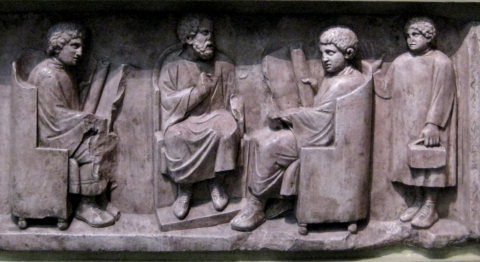Nandini Pandey and Katharina Wesselmann
April 15, 2021
As a fellow at the American Academy in Berlin this spring, working on a book on Roman diversity, I've been wondering how German classicists are experiencing current debates about diversifying our field. To find out, I spoke with Dr. Katharina Wesselmann, a professor in the Northern German city of Kiel who has also taught high school and university in Basel, Switzerland. The fact that she specializes in “didactics” — the teaching of ancient Greek and Latin — is one mark of the differences between our two national classics traditions. In Germany, Latin and Greek are regularly offered at the advanced secondary schools known as Gymnasiums. So more Germans than Americans are familiar with the classical languages, and those who pursue university degrees in classics can find employment teaching high school. On the other hand, entry into the professoriate is extremely restricted, curricular change is slow, and language training is heavily emphasized. For these and other reasons, German classicists do not yet reflect the country's changing demographics. And the challenges they face, while similar to ours in North America, emerge from a very different cultural and educational environment. My March 31st conversation with Dr. Wesselmann (check out her bio at the bottom of the article!), lightly edited below for length and clarity, helped me better appreciate what German and American classics might learn from one another.
In the U.S. and the U.K., many classicists are talking about the need to “decolonize” and diversify the field. What do people think about that discourse in Germany?
Well, to be honest, I think there is no real debate about decolonization in Germany. There have been a few reactions in the press, but not many. I think it's very tempting for Germans to see [these] as American problems because of slavery, and as British problems because there's quite a number of people who live in Britain who originate from former colonies. So it's tempting to say, we have nothing to do with that. And at the same time, I sense a strong fear among conservatives in Germany to invite U.S. and U.K. debates into German scholarship. Conservatives in Germany talk a lot about “hysterical” political correctness, about “cancel culture.” That's not just in classics, but in all kinds of fields, and not just regarding immigrants and non-white people, but also gender.
Do you or other scholars in Germany see any need for diversification, or including more people in the study of classics?
I do, actually. But it's hard to say, as there are no reliable statistics … and even if we tried to collect the data, it is quite hard to specify what counts as an “immigration background” [e.g., since third-generation Turkish families are still classed as migrants]. I do think that we have similar problems in Germany as in the EU and U.K., in that certain ethnic groups are being kept out of classics. It's not to say that anyone tells them they cannot study classics, but it starts with Latin and Greek being traditionally limited to the Gymnasium. That is the highest form of secondary education, and many German children don't make it there. [Studies conducted every other year by the Program for International Student Assessment show that] Germany's educational system is not permeable for people from weaker economic backgrounds. The situation is getting worse, and there you have a connection with ethnicity, because many migrant families are still economically struggling, and that leads to limited education. Many of them don't even enter the Gymnasium, where they could study Latin and Greek. And at university level, the selection gets worse, because it's not always easy to find a post as a Latin or Greek teacher, and students from poorer backgrounds tend to choose safer paths. Again, I do not have statistics, only my own observations and discussions with colleagues. It's my impression that other disciplines without secure job opportunities, like German literature or history — they seem a little more diverse. And that does, I think, have to do with the elitist image of classics, and maybe also with the European claim to classics. For example, traditionally in high school textbooks, you have a focus on Rome in the late Republic or early empire, but you probably won't have identification figures or stories set in Syria or Turkey.
You've anticipated one of my questions, which was, “What are some ways to make classics more permeable to some of those students that you're talking about?”
I think there are ways, and people are working on this. … Stefan Kipf, who is professor of didactics at the Humboldt University in Berlin, started the project Latinus Pons in 2008. So the university partnered with a Gymnasium in a Berlin neighborhood with a large number of migrant students, and their analysis showed that by learning Latin, the students' linguistic competence is greatly improved, especially in German, which wasn't their native tongue. … One very important way to go is teaching Latin outside the Gymnasium — and maybe even Greek, but let's not get too crazy. [We laugh and discuss other initiatives, e.g., new teaching materials for different school types currently being drafted by Peter Kuhlmann and others.] … In Switzerland, we've designed a Latin course for Gesamtschulen, so for a very heterogeneous group of students. The textbook is called Aurea Bulla, and it's very much focused on strengthening intuitive and metacognitive linguistic competences, but in very diverse learning groups. They study Latin in permanent comparison with modern languages, there's a lot of cultural history, and there's all kinds of levels that you can use or not use. I even conducted a study, which I am publishing [in the fall edition of the Zeitschrift für Interkulturellen Fremdsprachenunterricht]. We tested the students regarding competencies in German and other modern languages. And we connected these competencies with their linguistic background, with the languages they're speaking at home, and with their socioeconomic status, because these things [often] go together. ... And we show that the connection between economic status and the performance decreased [over the two years of the course]. That was very encouraging, because apparently multilingualism, which in Germany often goes along with a lower status, can be activated by learning Latin and by comparing languages.
I love that you're quantifying some of these measurable outcomes. Because in the U.S., I often feel that the conversation is quite selfish. It's about how classics can benefit from other people's diversity and not so much about what classics can do for minorities. I wonder if you have any other thoughts about how the study of classics — as opposed to say, modern languages or other types of humanities — can help people who are more disadvantaged in some way?
Well, I think first of all, there's the argument of learning a non-spoken language via linguistic theory [as opposed to intuitive learning of a modern language]. Because you normally don't learn Latin or Greek by speaking ... it's an abstract system which is a very good foundation for general linguistic competence. And the other also ancient argument is that ... Roman and Greek societies are very apt to be compared to modern society. The traditional ways of comparing them I find a bit simplistic — the narrative about how the Greeks invented democracy and so on. Of course, we know that the Greeks and Romans are also responsible for a lot of evil in the Western world, [as is] the western identification with the Greeks and Romans. ... But these are such important subjects, and I think with self-conscious Latin and Greek teaching, we can learn a lot about the West in good and in bad ways — also the arrogance of the West and the Eurocentrism of the West. And I think that's something that could be potentially very inclusive--and more so than maybe other school subjects.
Do you worry, though, that classics could be used to compound that Eurocentrism that's already built into so many of our systems of knowledge and advancement?
Well, they are — there are so many examples from the U.S., which you know better than I. But there's also a few examples from Germany. For example, we have a right-wing movement here called the Identitäre Bewegung. And they actually use as their logo the Spartan lambda popularized by the movie 300. And so obviously classics has been used to cement the narrative of the West's superiority, and there's no doubt about that. I mean, there's quotations by Hitler saying how much he admired the Greeks and Romans, actually making them expat Germanic tribes, which was very much in the wake of National Socialist “scholarship.” Even someone like Wilhelm von Humboldt, when he characterized the Greeks as an ideal people to study for German students — there is a level of naive idealization that you really have to be very astonished by today. I'm personally grateful to Humboldt, that he made Latin and Greek so important in the German school system, but his arguments are not very convincing.
You've already unpacked some of the rich engagements that German culture has with the classics, maybe much deeper ones in some regards than the U.S. and the U.K. I'm curious, are there any other comparisons or contrasts that you would make between the role and connotation of classics in German society versus American society?
In the present, I think classics are quite different in the Anglophone and the German-speaking worlds. And I think that the reason is that it is very much a high school subject in Germany, which, as far as I understand, it is not at all in the U.S.… and that makes it more available to more people, probably not so elitist. But on the other hand, it has a certain traditionality, and certain standards have to be met that school politicians basically fix [and] are very difficult. So innovation is quite difficult in Germany. And there's a lot of tradition and there are very tight core sets, for example, of how much translating you have to do in school. So I wish we were more open in Germany to broader issues of society. I am a great fan of scientific freedom. There should always be funding for projects that have no immediate social relevance. But I wish classics would participate more in current debates and not ignore them, or even see them as an attack on tradition. And I think that's something we could probably learn from the English-speaking world.
Among the wide range of topics we go on to discuss, we note that American programs rarely center Dr. Wesselmann's field of expertise, ancient language pedagogy. However, she is impressed by the care and thought that U.S. scholars devote to their teaching, citing an SCS blog post by Sara Hales and Arum Park on “Teaching Classics in the Age of #MeToo” as a particular inspiration. She also praises outreach efforts like reading the Odyssey with Vietnam vets. Dr. Wesselmann notes that the current German university system offers little scope for courses in translation for non-majors, one area where U.S. classics is most innovative and inclusive. I press her to name areas where the U.S. can learn from Germany. Her reply? Free, high-quality public education.
Header image: Relief found in Neumagen near Trier, a teacher with three discipuli (180-185 AD). Photo courtesy of Wikimedia Commons.
Authors



